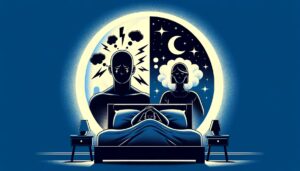Is Lucid Dreaming Dangerous?
Lucid dreaming captivates many with its promise of bending the dream world to one’s will. But as its popularity grows, so do the questions about its safety. Can engaging in this fascinating state of consciousness be harmful, or can it pose fatal risks?
What is Lucid Dreaming?
Lucid dreaming occurs when the dreamer is aware that they are dreaming and can exert some control over their dream actions. During a lucid dream, certain areas of the brain associated with self-awareness and cognitive control show increased activity. This unique state typically unfolds during the rapid eye movement (REM) phase of sleep. It’s this REM stage that is characterized by fast brainwaves, almost as active as when one is awake, which allows for vivid and often intense dreams.
REM Sleep and Its Connection to Lucid Dreaming
REM sleep, the sleep stage most associated with vivid dreams, constitutes about 20-25% of an adult’s sleep cycle. It’s during REM sleep that the body undergoes atonia or muscular paralysis, except for the eye muscles and the diaphragm. This natural paralysis helps prevent the dreamer from physically acting out their dreams, serving as a built-in safety mechanism during intense dreaming, including lucid dreams.
Addressing Safety Concerns in Lucid Dreaming
While thrilling, lucid dreaming raises concerns about potential sleep disruptions. Can the heightened awareness and control in a dream affect sleep quality or pose a safety threat? Initially, it helps to understand that while engaging and profound, there have been no direct reported cases of lucid dreaming leading to physical harm or fatality purely from the act of lucid dreaming itself.
Myth vs. Reality: Can Lucid Dreams Kill?
In exploring the mysteries of sleep, we often encounter sensational myths. It’s crucial to separate these myths from reality, especially regarding something as enigmatic as lucid dreaming.
Directly Addressing the Fatal Risks of Lucid Dreams
No, lucid dreams cannot directly cause death. The body’s mechanisms during REM sleep, such as sleep paralysis, protect the dreamer despite the vivid and often intense scenarios that may unfold within the dream. The physiological safeguard ensures you can explore the dream realm safely.
Physiological Processes During Sleep
During sleep, the body cycles through various stages, each serving essential restorative functions. In REM sleep, while the brain is active, the body’s physical inactivity ensures a safe barrier against the vivid enactment of dreams. Furthermore, regular cycles of non-REM and REM sleep ensure that the body and brain balance dream activities with deep restorative sleep, minimizing any physical risks.
The Phenomenon of Dying in Dreams
Dying in dreams can be a profoundly unsettling experience, contributing to the myth that dreams can be fatal. However, these experiences are symbolic and psychological rather than physical threats. Such dreams might reflect fear, anxiety, or transitions in life but do not pose a real danger to the dreamer.
Scientific Perspective on Lucid Dreaming’s Safety
The intrigue around lucid dreaming extends into the scientific realm. Numerous studies attempt to unravel its mysteries and implications.
Revealing Research on Lucid Dreaming
Research into lucid dreaming has largely indicated that it is a safe activity for most people. A landmark study published in the journal “Sleep” highlighted that lucid dreaming does not negatively impact the overall quality of sleep and might even offer some psychological benefits, such as enhanced problem-solving skills.
No Direct Fatalities Linked to Lucid Dreaming
There is no scientific evidence to suggest lucid dreaming is lethal. While sleep disturbances like nightmares can occur, they do not constitute a lethal risk. The lack of direct correlation between lucid dreaming and fatal outcomes provides comfort to those exploring this aspect of dreaming.
Impact of Intense Dreams on Sleep
While most lucid dreams do not disturb sleep patterns, intense dream content can sometimes lead to waking up feeling unrested. However, this is more about the emotional content of the dreams rather than a physiological safety concern related to lucid dreaming itself.
Lucid Dreamers Speak: Personal Safety Experiences
Hearing from those who regularly dive into the depths of lucid dreaming can provide invaluable insights into its safety and wonders.

Testimonials from the Dream World
Many avid lucid dreamers share that they experience no adverse effects from their adventures in the dream world. On the contrary, they often describe lucid dreaming as a transformative and empowering experience, offering them creativity and problem-solving perspectives they can bring into their waking lives.
A Spectrum of Experiences
However, a few recount moments of intense emotions or even panic that momentarily disrupts their sleep. These instances are typically linked to inexperienced individuals or those who might push too hard too fast into lucid dreaming practices without adequate mental preparation or guidance.
Recognizing the Risks: What’s Possible in Lucid Dreams
While not deadly, there are still aspects of lucid dreaming that warrant a cautious approach.
Realistic Risks Associated with Lucid Dreaming
Although rare, disorientation and confused wakefulness can occur, especially after intense lucid dreams. For some, especially newcomers, experiences like sleep paralysis—although naturally occurring—can be frightening if unexpected.
Mental Health and Lucid Dreaming
While many positive psychological effects have been documented, lucid dreaming can also amplify existing mental health issues for some individuals. It’s crucial to approach lucid dreaming with an awareness of one’s mental and emotional state and to practice it in a supportive, stress-free environment.
Conclusion
Reflecting back on what we’ve covered, it’s clear that while lucid dreaming carries no direct lethal risks, understanding and respect for this profound sleep phenomenon are crucial for a safe and enriching experience.
Safe Practices for Conscious Dreaming
Embarking on the journey of lucid dreaming can be thrilling, yet it’s crucial to prioritize safety to fully enjoy the experience without adverse effects. Here are some strategies to ensure your journey into dream manipulation remains as secure as possible.
Techniques and Habits for Safety
Lucid dreaming is a skill that can be nurtured with practice and proper mental preparation. Here are some techniques that can help safeguard your mind while you explore the dreamscapes:
- Mental Preparation: Before sleep, engage in meditation or relaxation exercises to clear your mind and set intentions for peaceful, controlled dreaming.
- Relaxation Techniques: Use deep breathing, progressive muscle relaxation, or guided imagery to induce a calm state that is conducive to controlled dreaming.
- Reality Checks: Regularly practice reality checks throughout the day to become more mindful and increase the likelihood of lucid dreaming.
Importance of Sleep Hygiene
A conducive sleep environment and good sleep hygiene are foundational to not only effective lucid dreaming but overall health. Here are some elements to consider:
- Consistent Sleep Schedule: Go to bed and wake up at the same time every day to regulate your body’s internal clock.
- Comfortable Sleep Environment: Ensure your bedroom is quiet, dark, and at a comfortable temperature. Limit exposure to electronics before bed.
- Avoid Stimulants: Reduce consumption of caffeine or heavy meals close to bedtime as they can disturb your sleep cycle.





0 Comments